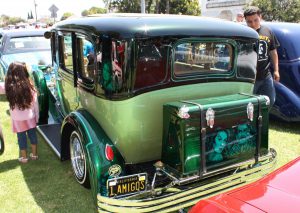Riding Low: For the Love of Lowriding
Part II

San Diego’s lowrider car club community is a multiethnic blend of car enthusiasts who come from diverse cultures, different genders, and various socioeconomic backgrounds. What was once a common lifestyle for primarily working class Latino and African American communities has become a celebrated form of artistic self-expression that unifies people from different walks of life through a shared passion and common purpose, the lowrider.
Since the 1960’s to the present, San Diego’s lowrider car clubs are not easy to quantify. To start, there are organized clubs, many of which are a part San Diego’s Lowrider Councils, and social clubs, which are informal and less structured. Rigo Reyes, member of Amigos Car Club says that, “Because the transition between social and organized car clubs is very vague there isn’t a fair count”. Rigo estimates that the San Diego region currently has around 25-30 car clubs. Add to that another 10-15 lowrider car clubs that are based in North County.
Currently there is one active female car club in San Diego, Unique Ladies. However in spite of the limited number of female car clubs, Rigo believes that unlike in the past, female clubs are more respected today than they once were. Female car clubs first appeared in San Diego in the late 70’s early 80’s. During their initiation the clubs were strong, organized, and formed part of San Diego’s Lowrider Council. Rigo affirms that it is also important not to overlook the presence of African American clubs, which are very much a part of the movement and evolution of lowriding.
Though being a lowrider does not require membership in a car club, car clubs are an essential part of the lowrider culture for various reasons, such as the sense of camaraderie that comes from belonging to a group that shares a common passion, and the knowledge and skills that members share. Rigo says that most members have a specific talent that becomes invaluable while working on a project. “(As members of a club) you bring different talents together and the closer you are as friends and family the idea is that you help each other out.” This is especially important because lowriding can become a costly investment. On a high end lowriders can easily invest between $50-100,000 into their cars.
Joe Arreguín, owner of J&V Automotive in Chula Vista has been building cars for 30 years. He assures that starting a project is a financial investment. A paint job alone can cost $8-10,000, while building a car from the ground up can take two years or more and cost $15-30,000. Those who favor vintage cars can plan on investing a lot more time and money into a project simply because the parts are no longer manufactured and are harder to find. Rigo owns a 1929 Willys Knight, which took six years to build. When he purchased the car people said it would never look good as a lowrider because no one had seen it done on a car that old. However Rigo had the vision and knew exactly what he wanted.
For lowriders restoring cars is a labor of love that requires time, attention, patience, detail and above all, creative vision. Once the car has been selected the real work begins. Joe says there is a lot to take into consideration, including style, parts, technique, and proper execution. But the love that goes into producing the car is evident in the final product. Some of the main characteristics that make lowriding so unique are the extraordinary level of creativity and ganas that it takes to step outside of society’s box to invent something that for many is unimaginable.
Lowriders are experts in the unconventional by cutting the roof of a car to make it convertible; or by taking the grill from a Cadillac, headlights from a Chevy and using the body of a Plymouth to create a car all its own, one that cannot be easily mass produced or duplicated. The frame, interior, paint, artistic detail, down to the very essence, which created it, is nothing less than authentic.
Next week Part III Riding Low: From the Old School to the New






